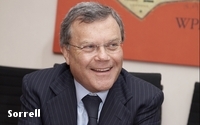
WPP reported Friday that it achieved a 6.1% 2015 revenue gain to 12.235 billion
British pounds, or approximately $17.3 billion at today’s exchange rate.
After-tax profit for the year was up 8.1% to 1.245 billion pounds, or $1.76 billion. On a call with
analysts, WPP CEO Martin Sorrell described 2015 as a “model year,” with record revenues and profits.
The holding company said organic revenue growth (which excludes acquisitions,
divestitures and currency fluctuations) for the year was up 5.3% and that organic net sales growth reached 3.3%.
By comparison, Interpublic reported 6.1% organic revenue growth for 2015,
Omnicom Group reported 5.3% and Publicis Groupe reported 1.5%. Unlike WPP, these holding companies do not report net sales organic growth.
WPP’s reported billings were up 3.1% to
47.6 billion pounds ($67.3 billion). Net new business on a billings basis for the year totaled 5.557 billion pounds ($8.613 billion).
The company said it topped media agency tracker
RECMA’s ranking of the winners in the so-called “tsunami” of recent media reviews, both in terms of new business and retained business. But while WPP may have been tops in
tsunami wins, its overall net new business (including creative agency wins) for 2015 came in slightly lower than for 2014.
Sorrell also said the “tsunami” of media reviews
will continue in 2016 albeit not quite at the same level of intensity. “The violence of the storm is lesser,” he said.
Sorrell also downplayed the notion that many clients
would rush to move their programmatic buying activity in-house, despite a report issued earlier this week by the Association of National Advertisers indicating
that 31% of respondents to a survey said they have expanded their in-house capabilities to manage programmatic ad buying.
The way he views it, Sorrell said, "clients are finding it
difficult to do," for a number of reasons. Investments in the technology to set up an in-house programmatic buying unit aren't cheap, he said. And finding and retaining the talent to run such an
operation is difficult, he added.
The company reported that January 2016 organic revenue was up 4.2%, with organic net sales up 2.3%, “ahead of budget” in both cases.
Currently the firm is projecting 2016 organic revenue growth of “well over” 3% and net sales growth of more than 3% as well.
The firm noted that “some commentators and
analysts believe that the markets are signaling a recession. Whilst some countries may technically go into recession (i.e. two consecutive quarters of negative GDP growth), we do not believe there
will be a general recession. More likely the markets are adjusting to continued low growth; so lower, longer -- both growth and interest rates.”
Overall, WPP said, clients remain
“risk averse” and are unlikely to raise marketing budgets much if at all given forecasted low GDP growth and ongoing geopolitical concerns including Middle East strife and worries about
the economic health of some countries such as China and Brazil.